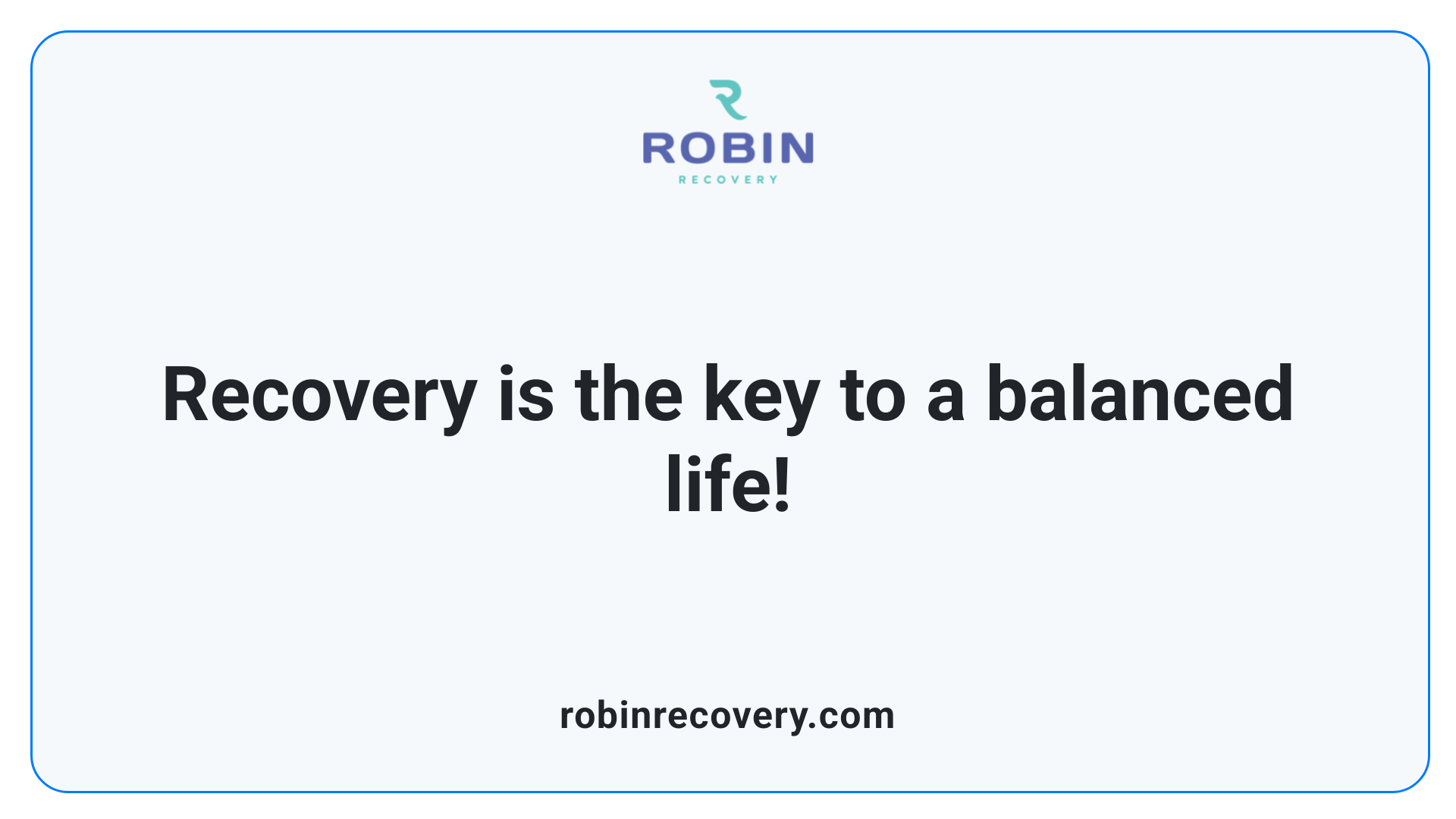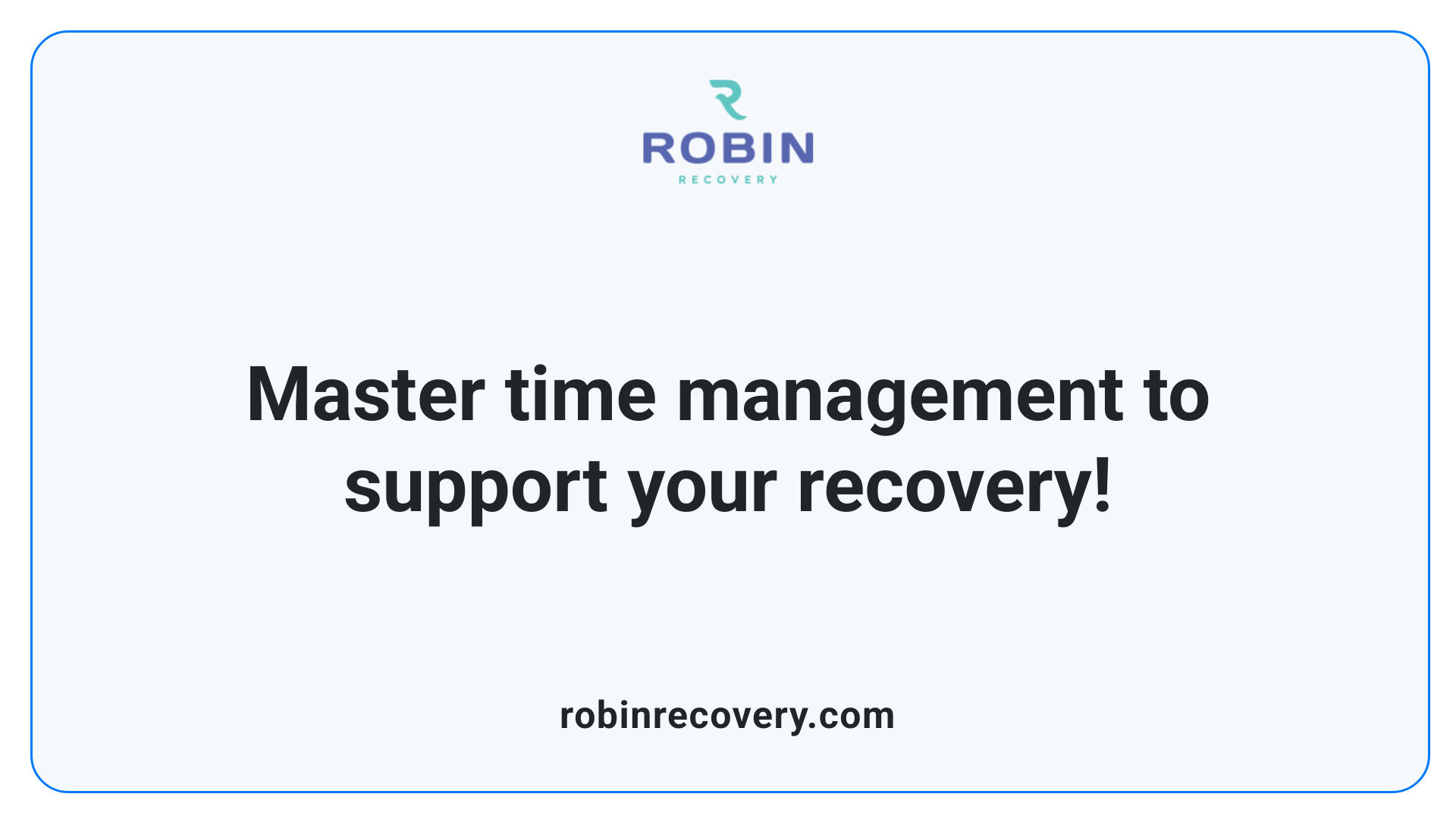How to Balance Responsibilities and Recovery Efforts

Finding Harmony Between Obligations and Recovery
For individuals navigating recovery, finding the right balance between personal responsibilities, professional duties, and self-care is essential but often comes with its own set of challenges. Building a solid framework for recovery involves intentional planning and strategy to ensure that priorities are set and achieved without neglecting any vital aspect of life. Understanding and implementing effective strategies for managing this balance can facilitate a successful recovery journey.
Prioritizing Recovery: The Foundation of Balance

Why is Prioritizing Recovery Essential?
Making recovery the primary focus is crucial for individuals trying to rebuild their lives post-addiction. Prioritizing recovery serves as the bedrock for a healthier lifestyle, enabling a person to manage challenges more effectively. By emphasizing recovery, individuals can significantly enhance their work and personal lives, leading to better overall outcomes.
Key benefits include:
- Reduced Stress Levels: A focused recovery can diminish the stressors associated with juggling multiple responsibilities.
- Improved Relationships: Prioritizing self-care and personal health fosters healthier connections with family and friends.
- Increased Productivity: Individuals often find that a strong commitment to recovery enhances their work performance by boosting focus and accountability.
How Can Recovery Impact Work and Personal Life?
The influence of recovery extends beyond mere abstinence from substances; it reshapes one's entire approach to life. Individuals who successfully prioritize their recovery develop healthier coping strategies, which in turn allow them to manage stress in their work and personal spheres more effectively.
Consider these effects:
- Enhanced Job Stability: A dedicated recovery plan reduces the risks of workplace burnout and relapses triggered by work stress.
- Improved Mental Health: Consistent self-care and recovery practices contribute to better mental well-being, enabling individuals to tackle personal and professional challenges with resilience.
- Sustained Motivation: Celebrating small achievements in both recovery and career creates a sense of accomplishment, fueling ongoing motivation.
What Are Five Important Factors for a Successful Recovery?
Five important factors for a successful recovery include:
- Setting Realistic Goals: Allows individuals to track progress and stay motivated.
- Building a Strong Support System: Encouragement from family and supportive peers is essential.
- Implementing Effective Coping Strategies: Tools like mindfulness and exercise help manage stress.
- Practicing Self-Care: Prioritizing physical and mental health builds a solid foundation for recovery.
- Maintaining Motivation and Perseverance: A commitment to personal growth strengthens the recovery journey.
Building Strong Boundaries at Work and Home

How can one balance work and recovery successfully?
Balancing work and recovery successfully involves making recovery the top priority in your life. To achieve this, establishing clear boundaries between work and personal time is essential. This means being open about recovery needs not just with family, but also with colleagues and supervisors to foster understanding and support in the workplace.
Utilizing effective time management tools like calendars and to-do lists can optimize daily productivity. These tools help you allocate specific time slots for work responsibilities as well as crucial self-care activities such as exercise, meditation, and therapy sessions. These activities are vital not just for your recovery, but also to prevent burnout and maintain overall well-being.
Additionally, building a robust support network is crucial. Engaging with support groups or therapy can offer accountability and encouragement throughout your recovery journey, helping to manage feelings of isolation often experienced during this process. You can reinforce your commitment to sobriety by staying connected with peers who understand your challenges and successes along the way.
Regular self-check-ins are another excellent method for ensuring you're meeting your emotional and physical needs. By practicing mindfulness and evaluating your state of balance, you can identify potential stressors and make timely adjustments to your routine, maintaining a healthy equilibrium between work and personal recovery.
Time Management: A Crucial Skill in Recovery

Effective time management strategies
Mastering time management is essential for individuals in recovery, enabling them to balance work responsibilities with their recovery needs. Here are some effective strategies:
- Create a Daily Schedule: Structure your day with dedicated blocks of time for work, recovery activities, and personal life. This helps ensure that you allocate time for essential self-care and support meetings.
- Set Priorities: Analyze tasks by importance and urgency. Focus on high-priority activities to prevent feelings of overwhelm while facilitating productivity in both work and recovery.
- Break Tasks into Smaller Steps: Large goals can be daunting. Dividing them into smaller, manageable steps can improve motivation and decrease stress.
Incorporating recovery activities into daily schedules
Integrating recovery into your daily routine is crucial for maintaining sobriety. Consider these tips:
- Schedule Self-Care: Allocate specific times for self-care activities like exercise, meditation, and therapy sessions to ensure they are respected as essential commitments.
- Utilize Tools: Leverage digital calendars and to-do lists to keep track of work deadlines and recovery meetings, ensuring nothing important slips through the cracks.
- Engage in Recovery Support: Participate in support group meetings regularly, and adjust your work schedule as needed to prioritize these valuable connections.
In this way, effective time management not only enhances productivity but also fosters a balanced life crucial for successful recovery.
Building and Leaning on Support Systems

Role of support systems in recovery
A robust support system plays a vital role in sustaining recovery from addiction. This network often includes friends, family, and peers who understand the challenges of recovery. Sharing experiences with others can create a sense of belonging and help mitigate feelings of isolation, which can be detrimental to sobriety.
Support groups, such as Alcoholics Anonymous (AA) and Narcotics Anonymous (NA), offer encouragement and valuable insights while establishing a community that fosters accountability. Engaging with these groups can be particularly beneficial for individuals navigating the complexities of balancing work and recovery.
Types of support and resources available
Different types of support systems can enhance recovery:
- Professional Guidance: Therapists and counselors provide crucial tools and coping strategies tailored to individual needs.
- Peer Support Groups: Environments like group therapy create spaces for sharing, which boosts motivation and reinforces the recovery journey.
- Family Involvement: Including family in therapy can improve communication and accountability, helping individuals mend relationships impacted by addiction.
- Self-Accountability: Keeping a journal to track behavior and progress can significantly aid in recognizing patterns and understanding personal triggers.
How do you maintain accountability in recovery?
Maintaining accountability in recovery is crucial for long-term sobriety and can be supported through several effective strategies. Keeping a journal to track behaviors and thoughts helps foster honesty about one's substance use. Attending support groups like AA or NA and engaging in regular therapy sessions provide essential peer support and professional guidance. Family therapy is also beneficial, as it enhances communication within families and encourages personal responsibility. Additionally, setting flexible and achievable goals, avoiding triggers, and creating a relapse prevention plan are vital steps in maintaining accountability throughout the recovery journey.
Support System Type Description Benefits Professional Guidance Therapists and counselors providing strategy Tailored coping mechanisms Peer Support Groups Groups like AA and NA Sense of community and shared experience Family Involvement Including family in therapy Improved communication and relationships Self-Accountability Journaling to track behaviors Enhanced self-awareness
Integrating Self-Care Into Daily Life

Importance of Self-Care
Self-care plays a crucial role in maintaining mental and physical health during the recovery journey. It encourages individuals to dedicate time to their well-being, which is essential for sustaining sobriety. Recovery can often bring about new responsibilities that may feel overwhelming. Prioritizing self-care helps prevent burnout and allows individuals to reconnect with themselves outside of their work and recovery obligations.
Moreover, engaging in self-care activities can facilitate the development of healthy habits. This not only enhances overall health but also reinforces positive routines that stabilize recovery. Consistent self-care practices can help manage stress, which is vital since high stress can lead to relapse.
Examples of Effective Self-Care Practices
To ensure a balanced and healthy lifestyle, individuals in recovery can incorporate various self-care practices into their daily routines. Here are some effective methods:
Self-Care PracticeBenefitsImplementation TipsExercise Boosts mood, reduces stress, and enhances physical health Set specific times for workouts; enjoy activities you love Meditation Improves mindfulness and reduces anxiety Start with short daily sessions; use guided apps Balanced Nutrition Supports physical health and boosts energy Focus on whole foods; plan meals ahead of time Journaling Enhances self-awareness and emotional processing Dedicate time each day to write thoughts and feelings Therapy Sessions Offers professional support and coping strategies Schedule regular appointments; find a therapist you connect with Quality Time with Loved Ones Strengthens social support networks Plan weekly get-togethers; prioritize meaningful interactions
Encouraging an ongoing focus on self-care can significantly impact recovery outcomes, leading to healthier and more fulfilling lives.
Achieving Long-Term Balance: Strategies for Success
Adapting to New Responsibilities Post-Recovery
Transitioning back into a full life after recovery presents new responsibilities that can feel daunting. This adjustment often requires individuals to navigate work, relationships, and personal interests simultaneously. Developing a structured routine can provide clarity and reduce the potential for feeling overwhelmed. A practical approach involves breaking larger tasks into smaller, digestible steps and ensuring time is allocated for both work and self-care activities.
Maintaining open communication with family and employers can foster understanding and support as you manage your recovery process alongside new obligations. Creating a balanced schedule allows for flexibility—ensuring recovery activities, like therapy sessions or support meetings, take precedence without compromising professional responsibilities.
Managing Personal Accountability Without Self-Criticism
Holding yourself accountable in recovery is vital for maintaining progress. However, it's important to note that accountability should not come at the expense of self-compassion. Distinguishing between constructive self-reflection and harsh self-criticism is critical. Learn to acknowledge missteps as part of the recovery journey without letting guilt overshadow achievements.
Practicing self-forgiveness is crucial. This involves recognizing feelings of guilt, making amends where necessary, and letting go of past mistakes. Building a support system with friends, family, or peers can enhance accountability by providing encouragement and a safe space to share experiences, fears, and successes. By managing personal accountability with kindness, individuals can navigate their recovery journey more effectively.
Strategy Description Benefit Establish a Structured Routine Create a daily schedule that allocates time for self-care, work, and personal life obligations. Provides clarity and reduces overwhelm Open Communication Discuss your recovery needs with family and employers for support. Encourages understanding and flexibility Break Down Responsibilities Divide larger tasks into smaller, manageable steps to avoid feelings of being overwhelmed. Increases feelings of accomplishment Practice Self-Forgiveness Acknowledge guilt without punishing yourself to cultivate a healthier mindset. Fosters emotional well-being
Taking Charge of Your Journey
Balancing recovery with life’s various responsibilities may seem daunting, but with the right plans and resources, it is entirely achievable. Embracing structure, maintaining open communication, and actively prioritizing self-care and support are all crucial elements that contribute to a harmonious recovery journey. Understanding that recovery is a personal process, it’s important to continually assess and realign your strategies, ensuring they meet your changing needs and aid in building a life of health, satisfaction, and fulfillment.
References
- Tips for Balancing Work, Life, and Recovery Successfully
- Balancing Work and Your Recovery
- How Do I Balance Responsibility And Self Care? - Choice House
- Find Balance in Life and Recovery | 7 Summit Pathways
- Why Structure and Routine Are Important in Recovery
- How To Balance Recovery While Working
- Mastering Work-Life Balance: Key Strategies for Professionals in ...
- Balancing Work and Recovery - The Perry Clayman Project
- Maximizing Sober Living: Balancing Work and Recovery
- How do I balance a high-pressure career and recovery?
